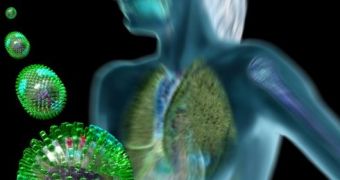H5N1 has severely affected the poultry industry in several Asian countries and made over 200 human victims.
People seem to get the infection after a close contact with diseased birds. But the fear comes from a possible mutation or combination with common human flu virus, a fact that could cause a global pandemic as by now there is no effective cure against the deadly virus.
But now, researchers from the Hospital for Tropical Diseases in Ho Chi Min City found that "immortalized" blood cells from two Vietnamese patients who survived this infection could be employed to completely treat the infection, not just to decrease its severity.
Lab grown antibodies coming from the patients' blood cells destroyed the H5N1 bird flu virus in mice and this could be effective also in humans. The antibodies were injected three days after the mice were infected. All 20 mice which received the injection survived, while all 5 mice in the control group deceased. The antibodies were also effective as a preventive therapy when administered before the mice were infected. Four blood-cell lines were found to synthesize the anti-bird flu antibodies; three of them were also effective against Indonesian strains.
By now, the standard treatment and prevention against bird flu is Tamiflu, but it is not 100 % effective (it does not save all the patients) and cases of Tamiflu resistant virus have already been recorded.
"What we are trying to do is add another arrow to the quiver of options for treating patients with H5N1 infection," said lead author Cameron Simmons.
"If it works after three days, that's very good news. It means you could use it after the first symptoms," said Albert Osterhaus, a bird flu expert at Erasmus University in Rotterdam, the Netherlands.
Even if other approaches have discovered the effectiveness of antibodies from animal blood cells against bird flu, this is the first research to employ antibodies from human survivors of H5N1. But unlike drugs, antibodies are much more expensive and harder to mass produce in case of pandemic. They could be used in case of local outbreaks, with few patients, stopping wider outbreaks.
"This is not a tool for public-health-level control of H5N1. It could be useful in the sort of setting at the moment where we have low levels of infection." said Simmons.
And if the virus mutates, the antibodies lose their power.

 14 DAY TRIAL //
14 DAY TRIAL //